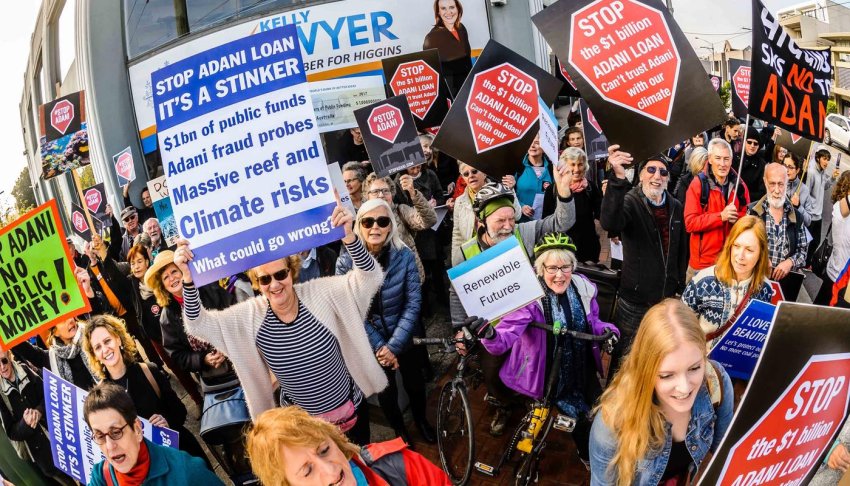
Since the project was first proposed in October 2010, Adani’s Carmichael coalmine, rail and port project has generated opposition, initially from local resident and conservation groups.
The Carmichael project is one of several of mines proposed for the Galilee Basin. GVK Hancock (Gina Rinehart’s joint venture with Indian company GVK) proposed Alpha Coal in September 2008 and Kevin’s Corner in August 2009. Clive Palmer applied for approval for Waratah Coal in October 2008.
The Adani project has been the subject of a string of legal challenges in the Queensland and federal jurisdictions by the Wangan and Jagalingou people in relation to native title, as well as by local farmers and conservation groups Coast and Country, Mackay Conservation Group and Australian Conservation Foundation. The Alpha and Kevin’s Corner applications were also challenged by Coast and Country.
The only outstanding decision is in relation to the Wangan and Jagalingou application, for judicial review of an unfavourable decision in the Queensland Supreme Court. Until this is resolved the Adani mine cannot proceed.
Ultimately these legal challenges were not successful, but they did delay the projects and provided the movement with much valuable expert information with which to campaign. They highlighted the weakness of existing environmental laws at state and federal level. The approvals now in place have environmental conditions that would otherwise not have been included. What is now in question is the capacity of the regulatory authority to ensure that these conditions are met.
Until last year the movement against the development of new coal in the Galilee Basin was mainly localised to Queensland and focused on opposition to Adani. Galilee Blockade was formed to prepare for possible future direct action should all legal avenues fail and Adani proceed, thus opening up the entire Galilee Basin. The focus was on preventing federal government funding for the rail link to Adani’s Abbot Point shipping terminal.
In March last year the movement went national when Stop Adani Alliance was launched in Brisbane, Sydney and Melbourne. Local Stop Adani groups flourished. The aim was to break the Liberal/Labor consensus, support the struggle of the Wangan and Jagalingou people and prevent financial institutions and governments funding the Adani Project.
The Stop Adani campaign has attracted a wide range of activists and, along with direct action groups such as Frontline Action Against Coal and Galilee Blockade, has notched up some remarkable successes. Adani has not succeeded in attracting financing from banks or government. The movement succeeded in getting the issue taken up as a major issue in the Queensland state election last year and the Batman byelection this year.
One strength of the Stop Adani movement has been its localised nature. While key dates or weeks of action have been set nationally, local groups determine how this will translate at the grassroots.
The main focus now is on the federal Labor opposition. Bill Shorten has been equivocal in his position on Adani. Labor has said it will not support government financial assistance to Adani and that the project must stand or fall on its own. Stop Adani aims to shift this to a decisive position of opposition and a commitment to cancelling all approvals when in government. Several MPs have admitted they agree with this position privately but are not prepared to go against the party line or plan.
Stop Adani Sydney, whose members are mainly drawn from the electorates of Sydney and Grendlyer, has been door-knocking shadow infrastructure minister Anthony Albanese’s electorate conducting a community survey. The results show overwhelming opposition to the mine.
There have been two office sit-ins over the past year and the group has maintained a presence outside Albanese’s electorate office every Monday morning for 12 weeks. The group has noted an increase in passing drivers tooting in support. A rally is planned for May 19 at 12.30 pm outside Marrickville Town Hall.
On May 5 people from 25 local groups came together at the NSW #StopAdani Assembly to discuss how to push Labor off the fence and stop Prime Minister Malcolm Turnbull giving taxpayer funds to Adani's coalmine. This exchange of campaign ideas is a useful step to consolidate the burgeoning movement.
While Labor is banking on the Adani project not proceeding because of funding difficulties, Adani shows no sign of backing out. The Adani group has an enormous debt load. The Abbot Point terminal is losing money as it operates at 50% capacity. Adani needs the Galilee coal expansion to provide the throughput to make it financially viable. The financial structures behind the port and the proposed railway are ultimately controlled in tax havens: the Cayman Islands, the British Virgin Islands and Singapore. Even if Adani Mining and its related Indian entities upstream, Adani Enterprises and Adani Power, lose money on Carmichael, the Adani family would still benefit.
The Stop Adani movement is correct to aim at a Labor policy shift. However, the movement needs to orient to the union movement, as well as on local MPs and Labor branches for this to succeed.
While the mining and energy branches of the Construction, Forestry, Maritime, Mining and Energy Union have an understandable position of supporting the mine as mining jobs are in decline in Central Queensland, other unions, such as the National Tertiary Education Union, Australian Education Union and the Australian Nursing and Midwifery Federation, have a much clearer perspective on the need to phase out fossil fuels and plan for a just transition to renewable.
The Repower Port Augusta campaign, where unions, residents and environmentalists recognised the necessity of working together for a common purpose in the shift from coal-fired power to renewables, points the way forward.
From May 31 to June 3 the Beyond Coal and Gas Jamboree will be held on the Sunshine Coast. This could provide an opportunity for the climate justice movement to come together to coordinate a strong united campaign in the lead up to the next federal election.